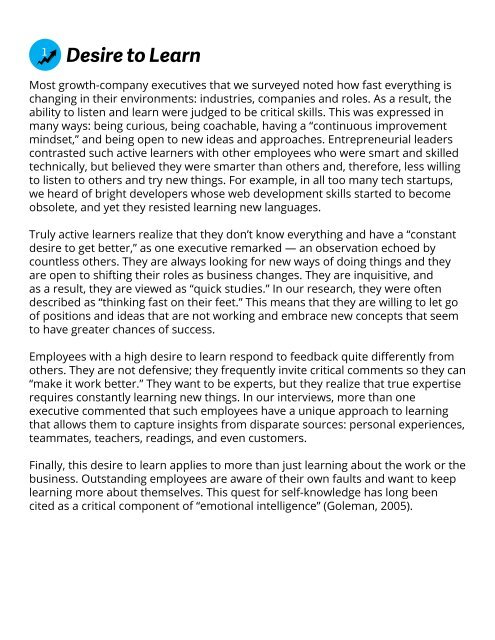The Six Characteristics of Successful Employees in Rapidly Growing Companies
1Q9Bymy
1Q9Bymy
Create successful ePaper yourself
Turn your PDF publications into a flip-book with our unique Google optimized e-Paper software.
1<br />
Desire to Learn<br />
Most growth-company executives that we surveyed noted how fast everyth<strong>in</strong>g is<br />
chang<strong>in</strong>g <strong>in</strong> their environments: <strong>in</strong>dustries, companies and roles. As a result, the<br />
ability to listen and learn were judged to be critical skills. This was expressed <strong>in</strong><br />
many ways: be<strong>in</strong>g curious, be<strong>in</strong>g coachable, hav<strong>in</strong>g a “cont<strong>in</strong>uous improvement<br />
m<strong>in</strong>dset,” and be<strong>in</strong>g open to new ideas and approaches. Entrepreneurial leaders<br />
contrasted such active learners with other employees who were smart and skilled<br />
technically, but believed they were smarter than others and, therefore, less will<strong>in</strong>g<br />
to listen to others and try new th<strong>in</strong>gs. For example, <strong>in</strong> all too many tech startups,<br />
we heard <strong>of</strong> bright developers whose web development skills started to become<br />
obsolete, and yet they resisted learn<strong>in</strong>g new languages.<br />
Truly active learners realize that they don’t know everyth<strong>in</strong>g and have a “constant<br />
desire to get better,” as one executive remarked — an observation echoed by<br />
countless others. <strong>The</strong>y are always look<strong>in</strong>g for new ways <strong>of</strong> do<strong>in</strong>g th<strong>in</strong>gs and they<br />
are open to shift<strong>in</strong>g their roles as bus<strong>in</strong>ess changes. <strong>The</strong>y are <strong>in</strong>quisitive, and<br />
as a result, they are viewed as “quick studies.” In our research, they were <strong>of</strong>ten<br />
described as “th<strong>in</strong>k<strong>in</strong>g fast on their feet.” This means that they are will<strong>in</strong>g to let go<br />
<strong>of</strong> positions and ideas that are not work<strong>in</strong>g and embrace new concepts that seem<br />
to have greater chances <strong>of</strong> success.<br />
<strong>Employees</strong> with a high desire to learn respond to feedback quite differently from<br />
others. <strong>The</strong>y are not defensive; they frequently <strong>in</strong>vite critical comments so they can<br />
“make it work better.” <strong>The</strong>y want to be experts, but they realize that true expertise<br />
requires constantly learn<strong>in</strong>g new th<strong>in</strong>gs. In our <strong>in</strong>terviews, more than one<br />
executive commented that such employees have a unique approach to learn<strong>in</strong>g<br />
that allows them to capture <strong>in</strong>sights from disparate sources: personal experiences,<br />
teammates, teachers, read<strong>in</strong>gs, and even customers.<br />
F<strong>in</strong>ally, this desire to learn applies to more than just learn<strong>in</strong>g about the work or the<br />
bus<strong>in</strong>ess. Outstand<strong>in</strong>g employees are aware <strong>of</strong> their own faults and want to keep<br />
learn<strong>in</strong>g more about themselves. This quest for self-knowledge has long been<br />
cited as a critical component <strong>of</strong> “emotional <strong>in</strong>telligence” (Goleman, 2005).


